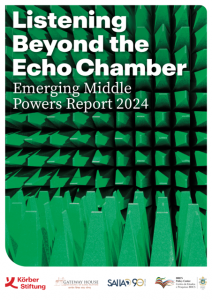
I ended a recent Post – “Can we foresee Middle Power Action in a World of Geopolitical Tensions?” indicating I wanted to examine further Middle Powers (MP) and Middle Power Diplomacy (MPD.) My hope: explore further what experts have suggested identifies MPs and characterizes MPD. I wanted to further look into views and insights from former Australian foreign minister Gareth Evans. We were fortunate enough to have him as one of the discussants in the webinar gathering on Australia and New Zealand as MPs. He subsequently kindly so we could quote him and then later provided us with remarks he delivered to a course at the Australian War College in Canberra last June.Let me therefore reel things back to MPs and MPD after examining the disempowering of multilateralism with the currently failed Plastics Treaty.
As it turns out I thought it might prove useful to expand the lens I had on Gareth Evans and to include insights as well from another discussant from a CWD session, Dr, Dino Patti Djalal. We were very fortunate to have such a wide set of discussants examining MPs and their behavior during our previous sessions on MPs and MPD. Dr. Djalal is the founder and chairman of the Foreign Policy Community of Indonesia (FPCI) and chair of Middle Power Studies Network (MPSN). In government Djalal served as Indonesia’s ambassador to the United States and Vice Foreign Minister of Indonesia. Recently he produced the first edition of “Middle Power Insights”.
Dr. Djalal has offered an extensive definition built on objective features as the foundation for understanding MPs:
“In this article, I refer to middle powers as countries that, by virtue of their considerable size (population and geography), weight (economic, diplomatic, and military strength), and ambition, are placed between the small power and great power categories. (Think of the middleweight division in boxing.) The combination of these three “SWA” metrics – size, weight, ambition – narrows down to a handful of middle powers, and covers those in the North and the Global South.”
Based on the extended definition above, the following list appears to be the MPs identified and mentioned by Dr. Djalal:
- Mexico
- Canada
- Australia
- Indonesia
- Saudi Arabia
- UAE (possibly)
- South Korea
- former ‘major powers’ of the 20th century now ‘pivotal middle powers’ including: possibly Germany,France, UK and Russia
- Iran
- Egypt
- Turkiye
- Brazil
- India
- South Africa
- Vietnam
We probably should likely add at least some of the Scandinavian countries – traditional MPs, along with Canada and Australia, including:
- Norway
- Sweden
- The Netherlands
And I would suspect that these additional states would also likely be recognized as MPs by most:
- Singapore
- New Zealand
“Of the 193 countries in the world today”, according to Djalal, “around two dozen qualify as middle powers – some are in the Global North but the majority”, as the list above shows, “are in the Global South.”
While Djalal does not provide a definitive list, the above constructed one identifies those MP countries at least mentioned by Djalal in his Report. As you see there are about two dozen as suggested by Dr. Djalal.
We were fortunate enough, as noted above, to include as one of our CWD discussants in our Australia session, the former foreign minister of Australia Gareth Evans. It is probably not all that surprising that Evans has a strong interest in MPs and MPD given he was foreign minister of Australia and a well known traditional MP . In his remarks later provided to us for our use he expressed an extended definition of MPs:
“There is no standard definition, or agreed international list, of ‘middle powers’, and no lack of continuing argument about not only the coverage of the concept, but its operational utility, and in some cases its acceptability to those so labelled.”
“For me, there are three things that matter in characterizing middle powers: what we are not, what we are, and the mindset we bring to our international role. ‘Middle powers’ are those states which are not economically or militarily big or strong enough to really impose their policy preferences on anyone else, either globally or (for the most part) regionally. We are nonetheless states which are sufficiently capable in terms of our diplomatic resources, sufficiently credible in terms of our record of principled behaviour, and sufficiently motivated to be able to make, individually, a significant impact on international relations in a way that is beyond the reach of small states.”
Unlike Dr. Djalal, Gareth Evans suggested some skepticism on relying on the objective measures that Dr. Djalal promotes. As he suggested in remarks he delivered at the War College last June he expressed this view:
“Focusing on objective measures of physical size – of population, GDP, landmass, defence expenditure or the like – doesn’t take the definitional argument very far.”
According to Evans MPD as practiced by these states provides:
“cooperation and coalition-building with like-minded countries in individual or niche issues that no single power can solve by acting alone.”
Evans then expands on this:
“I would describe ‘middle power diplomacy’, in turn, as having both a characteristic motivation and a characteristic method:
• “The characteristic motivation is belief in the utility, and necessity, of acting cooperatively with others in addressing international challenges, particularly those global public goods problems which by their nature cannot be solved by any country acting alone, however big and powerful; and
• The characteristic diplomatic method is coalition building with ‘like- minded’ – those who, whatever their prevailing value systems, share specific interests and are prepared to work together to do something about them.”
And as he describes it in his early remarks to CWD, this is how Evans sees MPD operating:
“For middle power diplomacy, as I have described it, to be effective, requires a number of factors coming together: practical opportunity, often limited given the realities of great and major-power dominance; available diplomatic resources, energy and stamina; intellectual creativity, seeing opportunities which others have missed; and credibility, practising what you preach and being seen as genuinely independent, nobody’s deputy sheriff…”
For Djalal with his focus on the active Global South MPs and their growing plurilateral coalitions:
“The world’s middle powers are changing the playbook in the international system.”
“The growing cooperation involving the middle powers – within the Global South, between the Global South and the North, between the Global South and the United States and China – is reshaping the international order.” …
“More and more, middle powers are positioning themselves to be a driving force in shaping regional architecture, thus compelling them to step up their response to the challenges inherent in their neighborhood. They are also spearheading various minilateral initiatives that can potentially supplement the provision of global public goods and also enhance the space for meaningful dialogue.”
So while these two experts do not exactly see ‘eye to eye’ they both see the influence of MPs and their diplomatic action on global relations. They do point to regional action and collaboration on the provision of public goods.
All this discussion of MPs leaves a couple of intriguing questions. Can we identify current action that we can subscribe to MP action? Can we describe the coalitional aspects of such MPD and is the behavior one way only, that is efforts to build coalitional effort to achieve effective global governance in a world of growing disorder?
As a start, the characterization we’ve just seen for MPs by both previous experts does contrast with a far more ‘realist perspective’ on MPs and MPD proposed by a set of scholars at the Institute for Peace and Diplomacy. In their 2022 article, “Middle Powers in the Multipolar World” by Moeini, Mott, Paikin and Polansky they target first the emergence of what they see as as a declining unipolarity and an emerging structure of multipolarity:
“With the international system shifting away from Pax Americana and toward a more multipolar world, a class of state actors usually called ‘middle powers’ is the subject of increased attention in policy and academic debates. Despite their rising prevalence, however, references to middle powers are often imprecise, inconsistent, surface level, and ad hoc—reflecting a general bias toward great powers and/or universalism that privileges systemic (global) analysis in mainstream international relations.”
For these experts the core understanding comes from the fact that these MP are regionally embedded:
“We show that middle powers are better defined by their 1) enduring regional presence and geographic rootedness, 2) considerable economic and military capacity relative to neighbors, 3) historical and cultural pedigree as civilizational states, and 4) the regionally-focused, limited extent of their ambitions — they seek not world domination but a sphere of influence in their near-abroad matching their historical range and scope.”
“Given the decline of unipolarity, growing disruptions and backlashes to globalization, and the fracturing and realignment of the global financial and political-economic system, region-based economic and political dynamics are likely to become ever more central to international politics. Understanding future geopolitical trends will depend on recognizing the reality and centrifugal force of multiplicity at the regional or sub-system level to which middle powers are anchored in a cohesive unity—with each civilizational node, the fulcrum of a regional security complex (RSC).”
“One could not speak of ‘middle powers’ without taking into account their symbiotic relationship with the geographical regions wherein they are located and recognizing that “security interdependence is normally patterned into regionally based clusters: security complexes.””
For these scholars, MPs are:
“In our scheme, middle powers emerge as anchors to these regional complexes, and the regional security complex forms around them. But the question remains: what distinguishes a middle power from other nation-states in a particular regional security complex, and what differentiates it from a great power?”
So what are the differences identified? According to these folks this is it:
Great powers are, practically speaking, global players—nations with the ability, or at least the potential, for global force projection and international action.”
“Middle powers, in contrast, are confined—both in intent and their activities—to their designated regional security environments due, for the most part, to their relative resource constraints.”
MPs then, according to the authors are:
“A major reason for this necessary paradigm shift is that middle powers are civilizational states, firmly rooted to a particular land, tradition, and culture and possessing a powerful historical memory.”
“In sum, a middle power is best defined by its relative power and superiority within the regional security complex it anchors, a well-developed cultural tradition and sense of identity that are the wellspring of relative solidarity, aspiration and capacity for regional—though not global—dominance, and ability to chart a course of import vis-à-vis great global powers while retaining its autonomy.”
“The regional requirement is thus a sine qua non for the category of middle powers, but the domestic health of a state matters too. Internal socio-political considerations, including regime stability, social cohesion, self-confidence, a common purpose, and effective leadership are the basic building blocks for all power: middle powers are no exception.”
Who then do these authors identify as today’s MPs:
“Therefore, based on our established criteria, we propose that Japan, Turkey, Iran, Brazil, Indonesia, India, Germany, France, the Anglosphere (the UK, Canada, Australia, and New Zealand when & where they work in tandem), Nigeria, and South Africa are all better understood as middle powers in the current global landscape.”
Certainly an identifiable subset of the MPs identified both by Djalal and Evans. But in contrast to both these MPs a regionally anchored set of states:
“In short, the multipolar world will greatly increase the geopolitical relevance of regions and enhance the ability of middle powers to lead them, with great powers less inclined to intervene from ‘above’.”
Now I am not doing ‘true justice’ to the very developed perspective presented by these experts but hopefully it does enough to present a strong contrast between the several visions presented. So then the question left is: Are we bound to focus on the collaborative efforts of MPs to press forward in advancing global governance initiatives; or are MPs embedded in conflict structures of the geopolitical world of great powers?
To that question I will return in the near future
Image Credit: MPSN (Middle Power Studies Network)
This Post was first published at my Substack Alan’s Newsletter:
https://substack.com/home/post/p-171565248

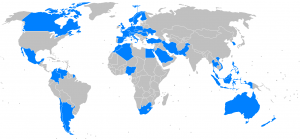
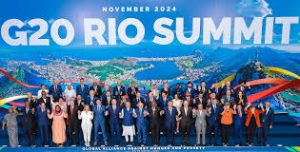
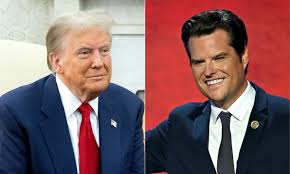
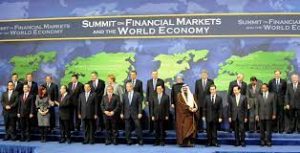 It is really not possible to begin this Substack Post without a quick glance at the first US Presidential debate of 2024. It was ugly. It was a tough night, especially for President Biden but I will let the political pundits to have their say.
It is really not possible to begin this Substack Post without a quick glance at the first US Presidential debate of 2024. It was ugly. It was a tough night, especially for President Biden but I will let the political pundits to have their say.